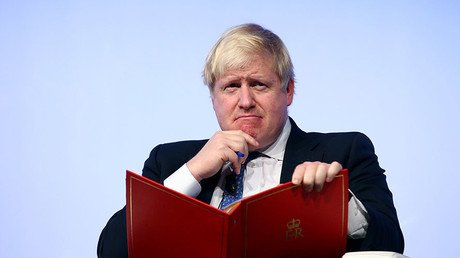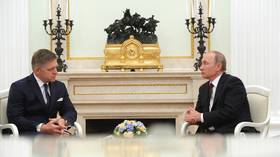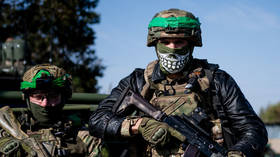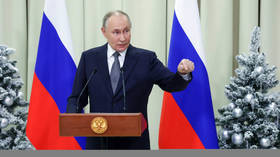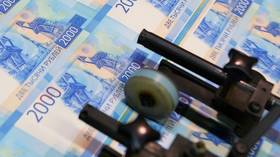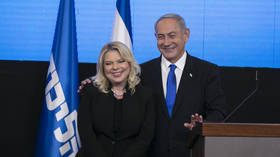NATO accuses Russia of fake news, while hysterically warning of WWIII
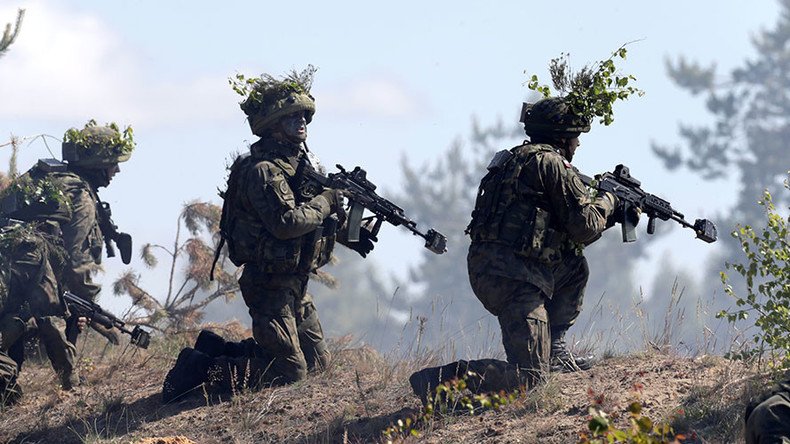
News media organizations in NATO member countries have no qualms about repeating unfounded, reckless claims of an imminent invasion of Europe by the Russian military, even threatening to ignite World War Three.
Yet when it comes to Russian media presenting valid alternative perspectives on a range of international issues, the Western alliance chokes up with accusations of Russian “fake news.”
“NATO says it sees a sharp rise in fake Russian news since the seizure of Crimea,” reported Reuters recently, ignorant of the fact that its own headline was itself purveying fake news.
Such ignorance is rampant among Western media and symptomatic of massive group-think demonizing Russia.
For a start, Russia did not seize Crimea, as is routinely stated in Western media as if fact. The people of the Crimean Peninsula voted in a legally constituted referendum in March 2014 to join Russia’s jurisdiction. But Reuters in the above headline uses the words “seizure of Crimea” without any qualification as if the historic referendum to join Russia was airbrushed out of history.
This is just one example of the daily distortion about Russian relations that is perpetrated in the Western media. If any side is guilty of peddling fake news, it is the Western news media of the NATO military alliance. And on an industrial scale.
For instance, earlier this month, CNN’s Christiane Amanpour conducted an interview with Marine Le Pen, the French leader of the Front National. Amanpour was aghast when Le Pen expressed the view that Russia did not annex Crimea and that the Maidan protests in Kiev in February 2014 were a coup d’état against an elected government. Amanpour’s shocked demeanor was understandable because she has on countless occasions asserted the opposite, as well as claiming Russia has “invaded Ukraine.” In each case, it can be argued the CNN celebrity journalist is wrong in her assertions about Russia-Ukraine relations, which means that she and her cable news employer are guilty of habitually churning out fake news.
Another instance of casual fake news presented as professional journalism was the BBC program GMT presented by Stephen Sackur on 3 February. Sackur, like Amanpour, is another celebrity journalist with preening self-importance. His program was reporting on the surge in violence in eastern Ukraine. Specifically, the report aired by the BBC implicated pro-Russian rebels in Donetsk region for shelling the town of Avdeevka. The insinuation was that Russia was stoking the violence. But only days before, the BBC broadcast video footage showing tanks belonging to the Kiev regime’s military taking up positions near homes in Avdeevka – in violation of the Minsk ceasefire.
Furthermore, the BBC’s Sackur then ran an interview with Kiev’s former prime minister, Arseniy Yatsenyuk, in which he was permitted to spout claims purporting as facts without ever being challenged. Those claims included: “Russian aggression in Ukraine” and “Russia shot down the Malaysian MH17 civilian airliner in July 2014 over eastern Ukraine."
Again, the point here is just how casually, and routinely Western mainstream media commit acts of fake news, which are presented as if fact by their “star journalists.”
Whatever Russian news media are accused of regarding fake news it is incomparable to the massive, systematic scale of fabrications and distortions churned out by the news media in NATO member countries.
NATO claims that it has listed over 30 “myths” the Russian news media have published. Unhelpfully, the NATO list does not provide links to original Russian news articles where the alleged myths are said to have been published. But a cursory reading of the list quickly shows that the so-called myths are nothing more “offensive” than Russian counter-arguments or what may be deemed as counter-perspective. Is NATO saying that to have a different point of view is somehow illegitimate?
Stating the FACTS on #Russia, #Ukraine and NATO https://t.co/3U3mpMMMnspic.twitter.com/El1DJx4zw8
— NATO (@NATO) February 13, 2017
For example, NATO counts Russian “fake news” to include claims that:
NATO tried to “drag” Ukraine into its membership;
NATO provoked the Maidan protests;
NATO is trying to encircle Russia;
NATO’s operation in Afghanistan was a failure;
NATO’s operation in Libya was illegitimate;
These points and more besides are not falsifications or baseless propaganda. They are serious contentions that can be substantiated with documented facts and legal argument as well as maps of proliferating NATO military bases on Russia’s borders.
Indeed, such perspectives completely confound the stereotype views that are promulgated on a daily basis by the Western media. But that in no way qualifies the contrarian Russian view as “fake.” Moreover, one can say that such views presented by Russian media are vital to proper public interest and understanding.
It is an astounding reflection of Western hubris and indoctrination that NATO members’ news media have published the following news stories which are patently false or turn reality on its head.
For instance, Russian and Syrian forces were allegedly committing wholesale slaughter of civilians in the city of Aleppo. For weeks the Western news media were screaming about the alleged massacre, only for the Syrian city to be eventually liberated from Western-backed illegally armed militants, including proscribed terrorist groups. No such civilian massacre occurred, and Western media have not bothered since to visit Aleppo to report on the return to normal civilian life thanks to the liberation by Russian and Syrian forces.
Another instance of rampant fake news carried in Western media is that Russian hackers subverted the US presidential election to get Donald Trump into the White House. No proof of these tendentious claims has ever been presented.
Yet the same claims are now being aired over alleged Russian interference in European elections – even though German state intelligence recently reported there was no evidence of interference.
German intelligence 'finds no evidence of #Putin disinformation campaign' https://t.co/RvBthxNtb3 by @BenWernerKnightpic.twitter.com/FamrBXrzCk
— dwnews (@dwnews) February 7, 2017
Let’s put the issue into perspective. Over the past year, British news media have published story after story claiming Russia was about to invade Europe and start World War III.
The Daily Express ran three such stories in June, July, and September.
It wasn’t just throw away tabloids that indulged in such reckless scaremongering. The supposedly more serious Independent ran at least two stories in May and September citing top military officials claiming that nuclear war could break out in 48 hours with Russia because of the latter’s “secret” invasion plans.
In November, the Guardian and other British news outlets, including the Daily Mail, Daily Telegraph, BBC, and Sky, echoed the view of MI5 chief Sir Ian Parker that “Russia is a growing threat to the UK.”
If British media reports were to be believed, then Europe and the whole northern hemisphere should have gone up in nuclear smoke several months ago.
Dealing in false news by NATO members’ media, as exemplified above, is not just wildly erroneous and unethical. It is illustrative of an orchestrated propaganda campaign to demonize Russia and recklessly create an atmosphere for global war.
In this context, to accuse Russian news media of “fake news” is a flagrant inversion of reality.
That NATO chiefs, Western governments, and the dutiful news media can get away with making such accusations is a disturbing sign of collective indoctrination. The irony of Western self-declared “free and independent” politicians and media behaving like an army of robots marching to war while accusing Russia of fake news is too much for words.
The statements, views and opinions expressed in this column are solely those of the author and do not necessarily represent those of RT.

